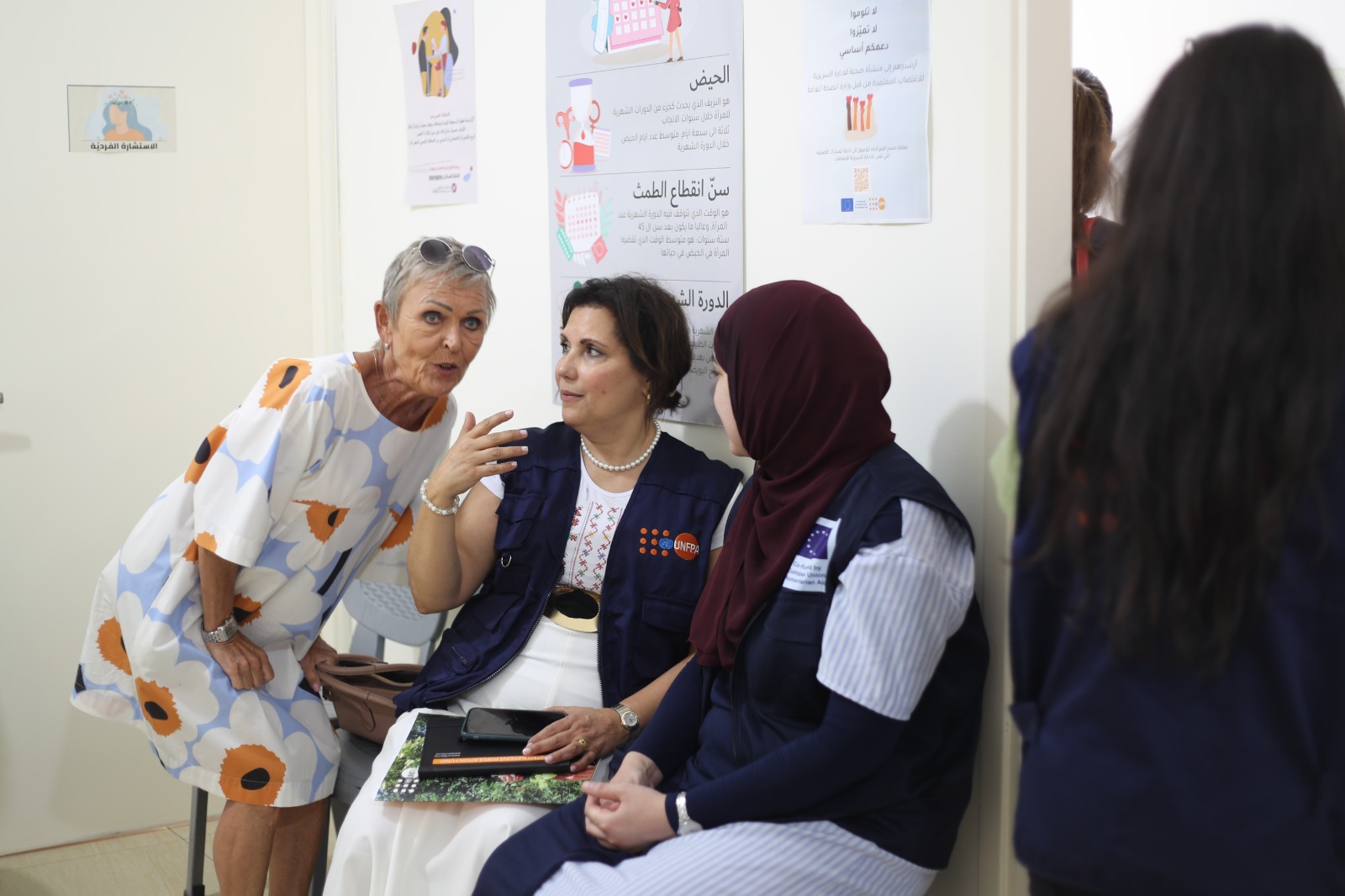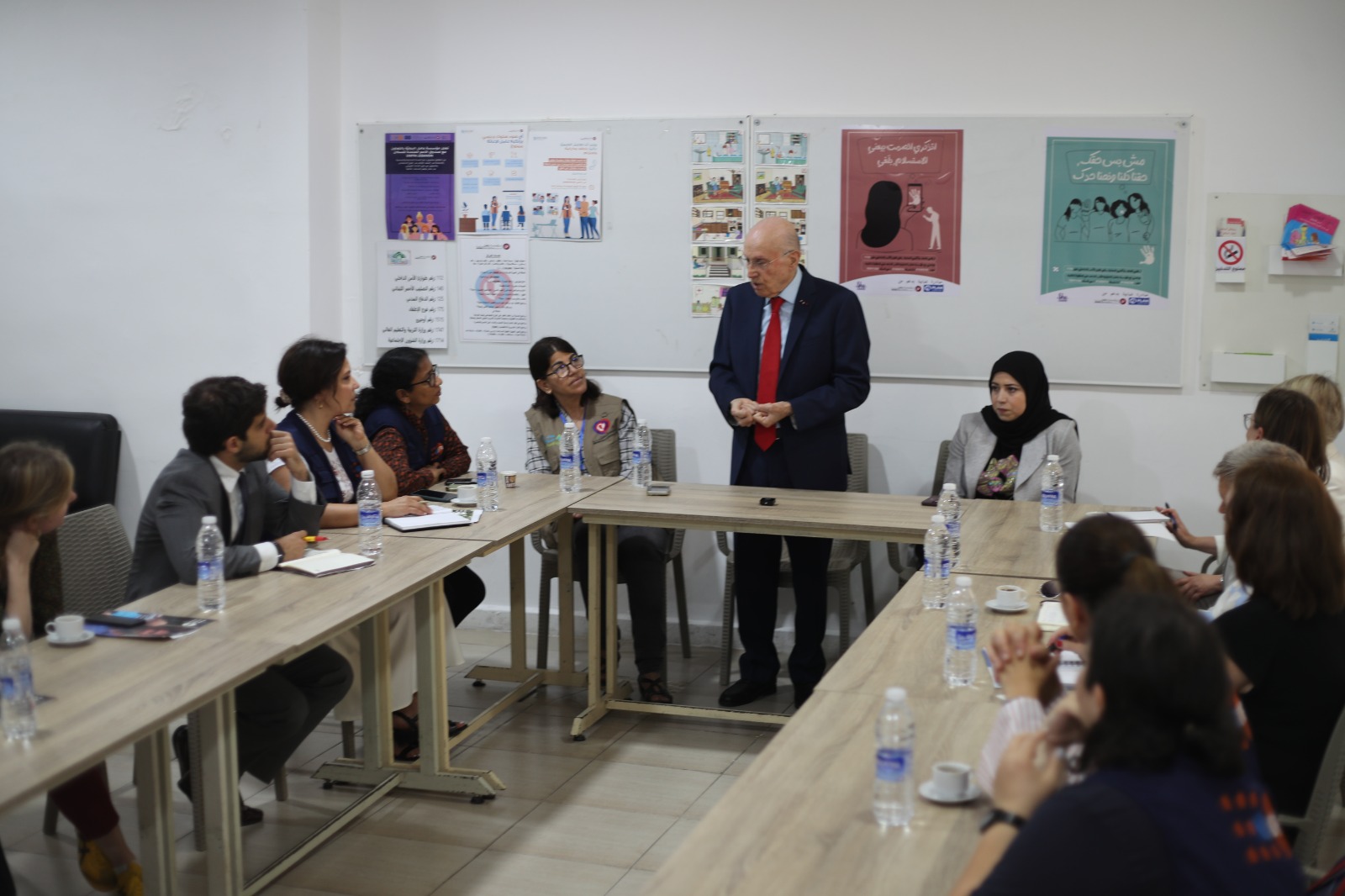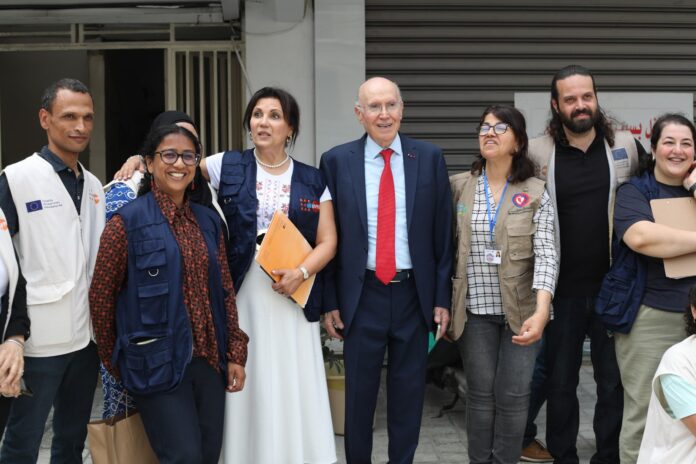Mohanna: We call on partners for increased support to preserve the human dignity of our people in vulnerable communities
Dr. Kamel Mohanna, President of Amel Association International, along with Dr. Leila Baqer, Regional Director of the United Nations Population Fund (UNFPA), welcomed a high-level diplomatic delegation from various European embassies at Amel’s Integrated Health and Development Center in Tyre, southern Lebanon. The visit was in response to an invitation by UNFPA, which supports Amel’s mission in multiple regions. It emphasized the importance of international solidarity with Lebanon and its host communities affected by war and displacement. Present were Board Member Dr. Darwish Chaghouri, Center Director Mona Chaker, Women Empowerment and Child Protection Program Director Lama Ajroush, and members of the Amel team.
 The delegation included: Finnish Ambassador Anne Meskanen, Head of Development at the German Embassy Uta Simon, Head of Mission at the Norwegian Embassy Reidun Boje, First Secretary at the Spanish Embassy Diego Cubo, First Secretary at the Swedish Embassy Dr. Sara Thomsen, Head of Mission at the Swiss Embassy Lynn Calder, along with UNFPA representatives in Lebanon Anandyta Philbos, Pamela DiCamillo, Maggie Gamm, Hiba Qachour, and Anastasia Al-Hajj.
The delegation included: Finnish Ambassador Anne Meskanen, Head of Development at the German Embassy Uta Simon, Head of Mission at the Norwegian Embassy Reidun Boje, First Secretary at the Spanish Embassy Diego Cubo, First Secretary at the Swedish Embassy Dr. Sara Thomsen, Head of Mission at the Swiss Embassy Lynn Calder, along with UNFPA representatives in Lebanon Anandyta Philbos, Pamela DiCamillo, Maggie Gamm, Hiba Qachour, and Anastasia Al-Hajj.
The visit included a field tour to a shelter center supported by Amel in partnership with UNFPA and European entities under the supervision of Tyre Municipality. The delegation reviewed the conditions of displaced families and listened to first-hand testimonies from affected individuals and local actors. Southern Lebanon has yet to witness effective recovery from the devastating war, increasing community fragility and requiring collective efforts to uphold people’s rights and dignity.
 The visit also covered Amel’s health and development center in Tyre, which remained open under the leadership of Mona Chaker despite ongoing shelling. The center suffered damage, including the destruction of part of the building and its mobile clinic. Nonetheless, Amel promptly rehabilitated it, driven by urgent needs and a belief that humanitarian work must not stop—whether in war or peace.
The visit also covered Amel’s health and development center in Tyre, which remained open under the leadership of Mona Chaker despite ongoing shelling. The center suffered damage, including the destruction of part of the building and its mobile clinic. Nonetheless, Amel promptly rehabilitated it, driven by urgent needs and a belief that humanitarian work must not stop—whether in war or peace.
In his address, Dr. Mohanna welcomed the guests and praised their continuous support, especially from UNFPA, highlighting the historic partnership and shared vision on the protection and empowerment of women and girls. He emphasized:
“Amel is not merely a humanitarian organization operating within geographic boundaries; it is a movement for change that aims to liberate people from all forms of dependency. Born out of war and invasion, Amel serves all people and seeks to build a society of justice and citizenship where humans live with dignity and independence.”
 He noted that Amel currently operates through 40 centers and 23 mobile clinics across Lebanon, with 2,300 staff and volunteers committed to human rights values, working in coordination with partner ministries and international bodies to deliver care and services—at a time when poverty in Lebanon has reached unprecedented levels.
He noted that Amel currently operates through 40 centers and 23 mobile clinics across Lebanon, with 2,300 staff and volunteers committed to human rights values, working in coordination with partner ministries and international bodies to deliver care and services—at a time when poverty in Lebanon has reached unprecedented levels.
Dr. Mohanna added:
“Our partnerships with the United Nations and European countries are not merely financial; they are value-based alliances aimed at serving the most marginalized communities. These partnerships are fundamental in our efforts to build a more just and humane world.”
He pointed out that Amel has so far rehabilitated the majority of the 14 centers damaged by war, while field teams in Tyre and other areas continue working without interruption, guided by a commitment to stand by people through all available means. He also highlighted Amel’s programs that protect and empower individuals—particularly children and women—through education, psychosocial support, healthcare, and social protection. He described these programs as “a cornerstone for crisis response and true community resilience.”
Dr. Mohanna concluded by stressing the importance of the solidarity model seen across many Lebanese regions, where local communities hosted thousands of displaced individuals. He called this model “the first building block of a civil state where the human being is the core value.” He urged the international community to take responsibility and contribute to rebuilding Lebanon as a beacon of intellectual and humanitarian excellence in the region.
For her part, Dr. Leila Baqer and the UNFPA team expressed pride in the impact of their joint programs with Amel, especially in the areas of women’s empowerment, advocacy for their rights, and ensuring dignified and safe access to services and protection. She also praised Amel’s team for their unwavering commitment to serving people in all circumstances.
Several ambassadors and international representatives gave remarks, commending Amel’s efforts and deep commitment to human dignity and social justice, reaffirming their ongoing support for this movement that represents the conscience of humanitarian action in Lebanon.


 Creative Commons Attribution 4.0 International license
Creative Commons Attribution 4.0 International license